Photo courtesy of CH2M HILL.
Technical assistance activities have and will be offered to agencies implementing Eco-Logical. Please see the list below to review the activities that have and will be conducted.
FHWA Eco-Logical Wildlife Crossing Workshop and Peer Exchange: Maggie Valley, NC
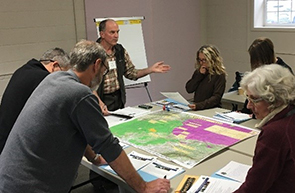
October 24-25, 2018
The Federal Highway Administration (FHWA) facilitated a workshop and peer exchange in Maggie Valley, NC on October 24-25, 2018. This event brought together key stakeholders and experts representing Federal, State, and nongovernmental agencies to discuss the growing bear and elk populations that are causing vehicle collisions and wildlife mortalities to rise along I-40 in Pigeon River Gorge and US 19 between Maggie Valley and Cherokee, NC. Participants shared information on wildlife data collection techniques and wildlife crossing options and discussed working towards a unified goal of developing a strategy to manage black bear and elk, reduce the risk of wildlife vehicle conflicts, inform the traveling public, and incorporate wildlife management strategies for consideration in highway design.
Read More…
Implementing Eco-Logical Accomplishments and Future Application Peer Exchange: Washington, DC
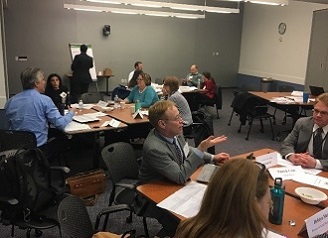
January 11, 2018
The Federal Highway Administration (FHWA) facilitated a Second Strategic Highway Research Program (SHRP2) Implementing Eco-Logical: Accomplishments and Future Application Peer Exchange in Washington, DC on January 11, 2018 at the U.S. Department of Transportation.
This peer exchange brought together Eco-Logical practitioners from the governmental and non-governmental organizational sectors at the Federal, state, and regional levels to review accomplishments under the program, and discuss a vision for Eco-Logical’s future.
Read More…
Programmatic Mitigation Peer Exchange: San Antonio, Texas
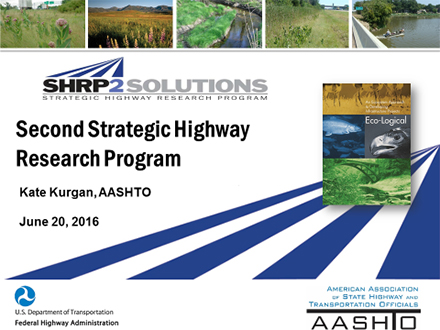
June 20, 2016
The American Association of State Highway and Transportation Officials (AASHTO) and Federal Highway Administration (FHWA) facilitated a Second Strategic Highway Research Program (SHRP2) Implementing Eco-Logical: Programmatic Mitigation Peer Exchange in San Antonio, Texas on June 20, 2016, at the AASHTO Standing Committee on the Environment meeting.
This programmatic mitigation peer exchange brought together transportation professionals from across the country to discuss and share their experiences developing and managing programmatic agreements for their agencies.
Read More…
Wildlife and Transportation for the Colorado Department of Transportation: Lakewood, Colorado
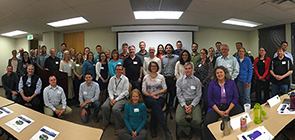
April 26-27, 2016
The American Association of State Highway and Transportation Officials (AASHTO) and the Federal Highway Administration (FHWA) hosted an Eco-Logical workshop for the Colorado Department of Transportation (CDOT) at the U.S. Fish & Wildlife Service (USFWS) in Lakewood, Colorado, on April 26-27, 2016. This event hosted scientists, engineers, and NEPA practitioners from all 5 regions of CDOT and focused on wildlife and transportation, specifically wildlife crossings. Presentations included topics on impacts to wildlife, wildlife crossing design options, planning and National Environmental Policy Act (NEPA) considerations, as well as the importance of agency partnerships and adaptive management activities post construction.
Read More…
Advance Wetland Mitigation Needs Workshop: South Carolina DOT (SCDOT)
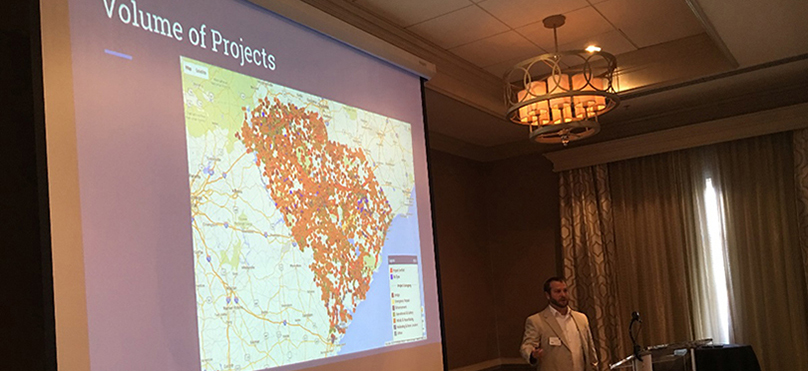
April 6-7, 2016
The American Association of State Highway and Transportation Officials (AASHTO) and the Federal Highway Administration (FHWA) hosted a workshop with South Carolina DOT (SCDOT) to prepare an action plan to establish an advanced wetland mitigation program.
The main purpose of the workshop was to assist SCDOT in preparing an action plan to establish an advanced wetland mitigation program. In addition, workshop attendees participated in action planning sessions to develop a working draft of SCDOT’s approach.
Read More…
Michigan Department of Transportation/Southeast Michigan Council of Governments
Technical Assistance Webinar
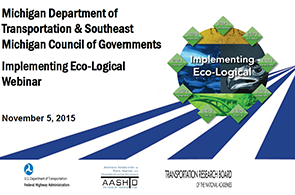
November 5, 2015
FHWA and AASHTO hosted an Implementing Eco-Logical webinar with the Michigan Department of Transportation (MDOT) and Southeast Michigan Council of Governments (SEMCOG) on November 5, 2015. The webinar served as a “virtual peer exchange” for MDOT and SEMCOG staff to learn from several metropolitan planning organizations (MPO) that currently participate in the SHRP2 Implementing Eco-Logical Implementation Assistance Program (IAP). MDOT and SEMCOG have been coordinating closely on MDOT’s Implementing Eco-Logical Implementation IAP Lead Adopter project. The webinar served as an opportunity for SEMCOG staff to learn about how other MPOs are currently applying the Eco-Logical approach.
Read More…
Implementing Eco-Logical Implementation Assistance Program (IAP) Peer Exchange
October 14-15, 2015
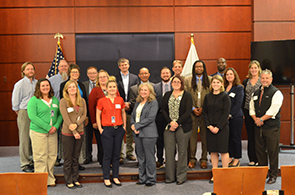
AASHTO and FHWA hosted an Implementing Eco-Logical Implementation Assistance Program (IAP) peer exchange at the U.S. Department of Transportation in Washington, D.C., on Wednesday and Thursday, October 14 and 15, 2015. The peer exchange included sessions for IAP recipients (noted with * below) to share accomplishments and lessons learned from their projects. Additional sessions included facilitated discussions on the Future of Eco-Logical, Integrating Eco-Logical into Transportation Planning Activities, Transforming Eco-Logical into “Business as Usual,” and Lessons Learned, Benefits, and Best Practices of Applying the Steps of Eco-Logical.
Participants included Alabama DOT, Atlanta Regional Commission,* Charlottesville Albemarle MPO,* Federal Motor Carrier Safety Administration, Louisiana DOT, Maine DOT,* Michigan DOT,* Mississippi DOT, North Central Texas COG,* Ohio-Kentucky-Indiana Regional COG,* Tennessee DOT, Wisconsin DOT, U.S. Environmental Protection Agency, U.S. Forest Service, and U.S. Fish & Wildlife Service.
Read More…
Eco-Logical at TRB - San Diego
Better Transportation and Environmental Outcomes through Effective Partnerships
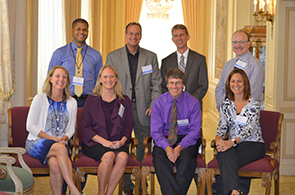
September 22, 2015
AASHTO and FHWA sponsored a session at this year’s TRB Environmental Analysis in Transportation Mid-Year Workshop, themed “Better Transportation and Environmental Outcomes through Effective Partnerships.” The session, “Eco-Logical at Work in Long-term Mitigation,” included presentations from Sandra Hertz, Deputy Director, Maryland Department of Transportation, State Highway Administration, on the Watershed Resources Registry (WRR); Travis Miller, Ohio-Kentucky-Indiana Regional Council of Governments, on the Natural Heritage Data (NHD) information systems for OKI’s planning area; and Craig Casper and Rich Muzzy, Pikes Peak Area COG, on the development of the Regional Advance Mitigation Plan (RAMP). James Garland, FHWA, provided an overview of Eco-Logical and the SHRP2 program. Keith Greer, San Diego Association of Governments (SANDAG), and Kim Smith, Caltrans, served as session moderators.
Read More…
Eco-Logical Peer Exchange: Establishing a Regional Ecosystem Framework (REF)
July 6, 2015
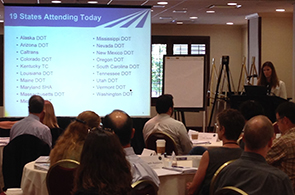
AASHTO and FHWA hosted a peer exchange at AASHTO’s Conference on 21st Century Mobility for Freight and Passenger Transportation in Salt Lake City, Utah, on Monday, July 6, 2015. The peer exchange was moderated by Kevin Walsh (Massachusetts DOT) and Susan Haupt (Oregon DOT). Guest speakers included Mike O’Malley (Michigan DOT), Kris Gade (Arizona DOT) and Donna Buscemi (Maryland SHA). Participants included environmental practitioners and transportation planners from State DOTs in Alaska, Arizona, Colorado, Kentucky, Louisiana, Maine, Maryland, Massachusetts, Michigan, Mississippi, Nevada, New Mexico, Oregon, South Carolina, Tennessee, Utah, Vermont, and Washington. The subject of the peer exchange focused on how to establish a Regional Ecosystem Framework (REF). During the morning session, participants heard from the presenters on their REFs and how they benefitted their projects and overall program. In the afternoon, participants conducted mapping activities to establish their own REF by reviewing the needs of their State and projecting how an Eco-Logical REF could benefit their program.
Read More…
Eco-Logical Peer Exchange: Mitigation Approaches for Metropolitan Planning Organizations
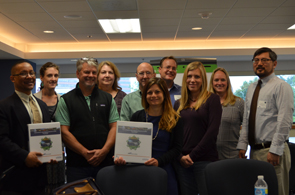
June 2-3, 2015
AASHTO and FHWA facilitated an Implementing Eco-Logical Mitigation Peer Exchange with Metropolitan Planning Organizations (MPOs), held in Arlington, VA, on June 2nd and 3rd, 2015 at the National Highway Institute. The participants were from East-West Gateway Council of Governments, Metropolitan Transportation Commission (MTC), North Central Texas Council of Governments (NCTCOG), and SANDAG. Guest speakers included Lauren Diaz and Steven Martin from the U.S. Army Corps of Engineers (USACE) and Deblyn Mead from the U.S. Fish and Wildlife Service (USFWS). MPO participants discussed the status of the status of their regional data, associated mapping tools, and plans to share that information to promote the development of conservation objectives for their region.
Read More…
Eco-Logical Technical Assistance Workshop: MaineDOT
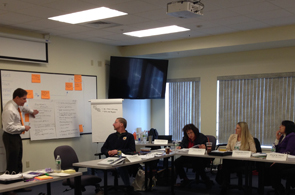
April 1-2, 2015
AASHTO and FHWA facilitated an Eco-Logical workshop with MaineDOT, the U.S. Fish and Wildlife Service, the U.S. Army Corps of Engineers, the National Marine Fisheries Service, and the Maine Department of Marine Resources in Augusta, Maine, on April 1st and 2nd. The workshop supports MaineDOT’s SHRP2 Eco-Logical award and program, and focused on the development of the Programmatic Biological Assessment for Atlantic salmon and draft Mitigation Instrument. The workshop produced an agreed-upon action plan and schedule to complete these documents.
Read More…
Eco-Logical Peer Exchange: Mitigation Approaches for State DOTs
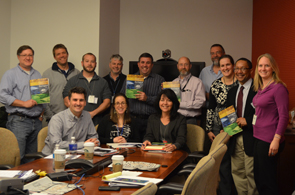
March 11-12, 2015
AASHTO and FHWA hosted a peer exchange on programmatic mitigation with State Departments of Transportation (DOTs) at FHWA Headquarters office in Washington, D.C., on March 11th and 12th. The participants were from California DOT, South Carolina DOT, Colorado DOT, and Florida DOT. Guest speakers included Lauren Diaz from the U.S. Army Corps of Engineers and Deborah Mead from the U.S. Fish and Wildlife Service. DOT participants discussed their State programmatic mitigation needs and exchanged dialogue with other participants to help advance their programs.
Read More…
Other Peer Exchanges
Eco-Logical Grant Recipient Peer Exchange for Implementation of the Eco-Logical Approach
GIS Applications in Eco-Logical Grant Projects – Peer Exchange Summary Report
Other Meetings
Webinar Series
Increasing the Use of Wildlife Data in Transportation Plans and Projects across the West Workshop
May 28-29, 2015
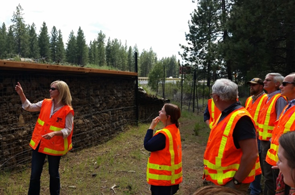
Cidney Bowman, ODOT, talks about U.S. 97 Lava Butte wildlife crossing structures. (Photo courtesy of WGA)
The Oregon Department of Transportation (ODOT) and Oregon Department of Fish and Wildlife sponsored a workshop on May 28-29, 2015, in Bend, Oregon. The event brought together over 30 State wildlife and transportation professionals to discuss ways to:
- Integrate state Crucial Habitat Assessment Tools (CHATs) with the Federal Highway Administration (FHWA) Eco-Logical framework.
- Increase the use of wildlife data in transportation plans and projects in western states.
- Identify opportunities to use state CHATs and the Western Association of Fish and Wildlife Agencies (WAFWA) CHAT in transportation planning and projects.
To link the discussions with project examples, ODOT led a field trip to showcase U.S. 97 Lava Butte wildlife crossing structures. A steering committee will use the workshop feedback to finalize an opportunities matrix, report on CHATs and Eco-Logical, and other project deliverables. These products will be available in September 2015.
Participants included 11 state DOTs and 7 state wildlife agencies:
- State DOTs: Alaska, Arizona, California, Idaho, Kansas, Montana, Nebraska, Nevada, Oregon, Washington, and Wyoming.
- State wildlife agencies: Arizona, Idaho, Montana, New Mexico, Oregon, Utah, and Washington.
This workshop was held in support of the Western Governors’ Association (WGA), Western Transportation Institute, and Center for Large Landscape Conservation effort to increase the use of digital wildlife information by transportation agencies. This effort is funded by the FHWA. In December 2013, WGA launched a regional CHAT, an online system of maps that displays crucial wildlife habitat. In May 2015, WGA transitioned hosting and management of the website to the WAFWA. The tool is now known as the WAFWA CHAT and is online at www.wafwachat.org/.
For more information: Katie Kalinowski, Western Governors’ Association, kkalinowski@westgov.org.

